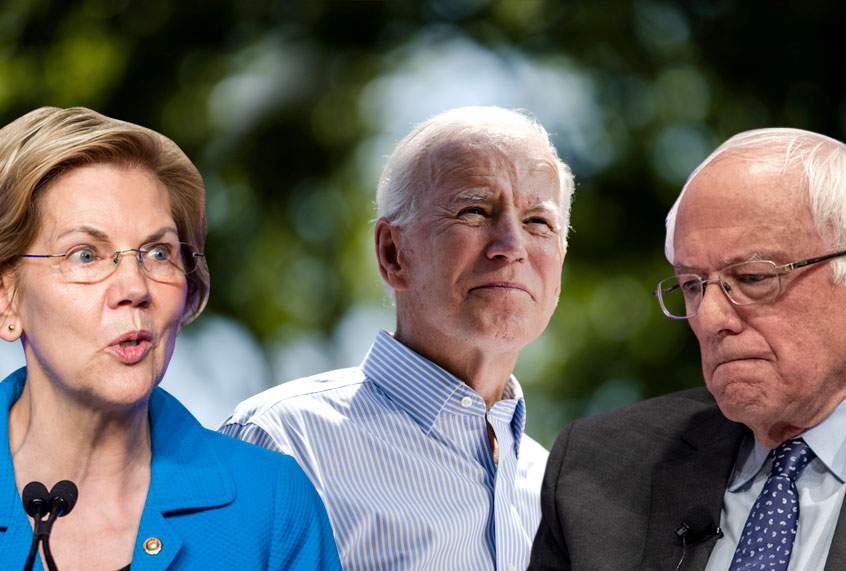On Monday, a new Monmouth University poll set the political world buzzing, with the surprising result that former Vice President Joe Biden — still widely regarded as the Democratic frontrunner — was effectively in a three-way tie with Sen. Bernie Sanders of Vermont and Sen. Elizabeth Warren of Massachusetts. According to the poll, those three are tightly packed are at the top of the field of 2020 Democratic candidates, with everyone else well behind.
Among registered Democrats and Democratic-leaning independent voters, the Monmouth poll found Sanders and Warren at 20 percent, with Biden is at 19 percent. That would mean that Biden has fallen by 13 points since the last Monmouth survey in June, while Sanders has gained six points and Warren has gained five.
Those three are followed by California Sen. Kamala Harris at 8 percent, New Jersey Sen. Cory Booker at 4 percent, Mayor Pete Buttigieg at 4 percent, and former tech entrepreneur Andrew Yang at 3 percent. Former HUD secretary Julián Castro, former Rep. Beto O’Rourke and self-help author Marianne Williamson were all at 2 percent, with all other candidates at 1 percent or below.
The Monmouth University Poll was conducted by phone August 16 through 20. A random sample of 800 adults across the country were polled. In this poll, 298 registered voters who identify as Democrats or lean toward the Democratic Party were polled, which makes a margin of error of plus or minus 5.7 percentage points.
That’s a relatively small sampling of Democratic voters and a relatively high margin of error, which led many Twitter users, including the Biden campaign and FiveThirtyEight polling guru Nate Silver, to question the poll’s validity.
Biden pollster John Anzalone on new Monmouth poll: “Sometimes there are going to be outliers. We kind of all forget that 5 out of 100 polls are just going to be wrong. It’s statistics. . . . It’s like one of the Sesame Street song, ‘One of these things is not like the others.’”
— Michael Scherer (@michaelscherer) August 26, 2019
Is Warren still gradually moving up in polls? Very likely, yes.
Is Biden gradually moving down? Quite possibly but not as clear.
Is Sanders on a bit of an upward trajectory? Maybe, but even less clear.
Have there been any sudden shifts in the past ~1-2 weeks? Pretty doubtful.
— Nate Silver (@NateSilver538) August 26, 2019
Interestingly, however, Silver’s site rates Monmouth as an “A+” poll, and ranks it highly in calculating polling averages.
Although this poll is certainly not good news for Biden, it’s also offered little good news for any of the candidates who have yet to qualify for the next Democratic debate in late September. This was the first nationally recognized poll to show Marianne Williamson at 2 percent, but she would need three more to qualify before the deadline, which is on Wednesday, Aug. 28. While 10 candidates have already qualified for the next debate, it appears likely that Sen. Michael Bennet of Colorado, New York Mayor Bill de Blasio, Montana Gov. Steve Bullock, Rep. Tulsi Gabbard of Hawaii, Sen. Kirsten Gillibrand of New York and Rep. Tim Ryan of Ohio will all fall short.
According to the poll, Biden’s decline comes from registered Democrats and Democratic-leaning independent voters who consider themselves “moderate” or “conservative.” Sanders and Warren have each gained 10 points among those voters — a slightly perplexing result, since both are identified as progressives. Biden also lost 15 points among voters under age 50, and 17 points among those without a college degree.
Warren’s favorability ratings increased, while Biden’s decreased. Sanders’ remained the same.
Patrick Murray, director of the Monmouth University Polling Institute, told The Hill in a statement that this survey indicates the race for the Democratic nomination is changing.
The main takeaway from this poll is that the Democratic race has become volatile. Liberal voters are starting to cast about for a candidate they can identify with. Moderate voters, who have been paying less attention, seem to be expressing doubts about Biden. But they are swinging more toward one of the left-leaning contenders with high name recognition rather than toward a lesser known candidate who might be more in line with them politically. It’s important to keep in mind this is just one snapshot from one poll. But it does raise warning signs of increased churning in the Democratic nomination contest now that voters are starting to pay closer attention.


